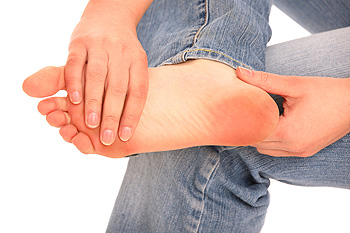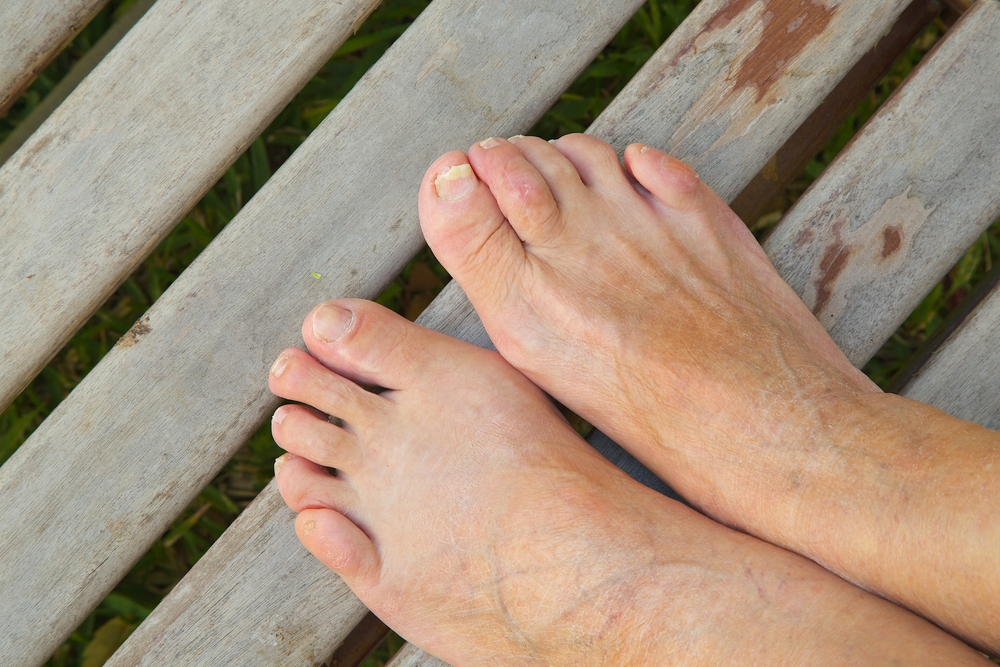
 The nerve that becomes thick or irritated in patients that have Morton’s neuroma is referred to as the plantar interdigital nerve. This condition can produce severe pain and discomfort, and generally occurs between the second, third, or fourth toes. It can develop as a result of wearing shoes that do not have adequate room for the toes to move freely in, or from repetitive impact that can come from participating in running and jumping activities. Common symptoms that many patients experience can include a burning pain in the forefoot, and many people often describe the feeling as having a small stone that is lodged under the foot. If you are afflicted with Morton’s neuroma, please confer with a podiatrist as quickly as possible who can effectively treat this condition.
The nerve that becomes thick or irritated in patients that have Morton’s neuroma is referred to as the plantar interdigital nerve. This condition can produce severe pain and discomfort, and generally occurs between the second, third, or fourth toes. It can develop as a result of wearing shoes that do not have adequate room for the toes to move freely in, or from repetitive impact that can come from participating in running and jumping activities. Common symptoms that many patients experience can include a burning pain in the forefoot, and many people often describe the feeling as having a small stone that is lodged under the foot. If you are afflicted with Morton’s neuroma, please confer with a podiatrist as quickly as possible who can effectively treat this condition.
Morton’s neuroma is a very uncomfortable condition to live with. If you think you have Morton’s neuroma, contact one of our podiatrists of Grand Blanc Family Footcare. Our doctors will attend to all of your foot care needs and answer any of your related questions.
Morton’s Neuroma
Morton's neuroma is a painful foot condition that commonly affects the areas between the second and third or third and fourth toe, although other areas of the foot are also susceptible. Morton’s neuroma is caused by an inflamed nerve in the foot that is being squeezed and aggravated by surrounding bones.
What Increases the Chances of Having Morton’s Neuroma?
Morton’s neuroma is a very treatable condition. Orthotics and shoe inserts can often be used to alleviate the pain on the forefront of the feet. In more severe cases, corticosteroids can also be prescribed. In order to figure out the best treatment for your neuroma, it’s recommended to seek the care of a podiatrist who can diagnose your condition and provide different treatment options.
If you have any questions, please feel free to contact our office located in Grand Blanc, MI . We offer the newest diagnostic and treatment technologies for all your foot care needs.
 Burning pain in the joints of the big toe is a common symptom that is often associated with gout. This condition can be caused by excess uric acid in the blood levels and crystals can form in the joints. This can lead to severe pain and discomfort, and walking may be difficult. Some of the reasons gout may develop can come from genetic factors, obesity, and eating foods that have high levels of purines. These can include shellfish, red meat, and drinks that are made with large amounts of sugar. Patients who are afflicted with gout may find relief when healthy eating habits are implemented, and it can be beneficial to follow a simple exercise program. People who have gout are strongly advised to be under the care of a podiatrist who can effectively treat this condition.
Burning pain in the joints of the big toe is a common symptom that is often associated with gout. This condition can be caused by excess uric acid in the blood levels and crystals can form in the joints. This can lead to severe pain and discomfort, and walking may be difficult. Some of the reasons gout may develop can come from genetic factors, obesity, and eating foods that have high levels of purines. These can include shellfish, red meat, and drinks that are made with large amounts of sugar. Patients who are afflicted with gout may find relief when healthy eating habits are implemented, and it can be beneficial to follow a simple exercise program. People who have gout are strongly advised to be under the care of a podiatrist who can effectively treat this condition.
Gout is a painful condition that can be treated. If you are seeking treatment, contact one of our podiatrists from Grand Blanc Family Footcare. Our doctors will treat your foot and ankle needs.
What Is Gout?
Gout is a form of arthritis that is characterized by sudden, severe attacks of pain, redness, and tenderness in the joints. The condition usually affects the joint at the base of the big toe. A gout attack can occur at any random time, such as the middle of the night while you are asleep.
Symptoms
Risk Factors
Prior to visiting your podiatrist to receive treatment for gout, there are a few things you should do beforehand. If you have gout you should write down your symptoms--including when they started and how often you experience them, important medical information you may have, and any questions you may have. Writing down these three things will help your podiatrist in assessing your specific situation so that he or she may provide the best route of treatment for you.
If you have any questions, please feel free to contact our office located in Grand Blanc, MI . We offer the newest diagnostic and treatment technologies for all your foot care needs.
 Falling can be dangerous for the elderly, and while you should be vigilant while outdoors, most falls actually occur inside the home. Making the home a safe environment by finding and fixing tripping and falling hazards, can help prevent falls. Some potential tripping hazards are computer and electrical wires, which can be made less dangerous by coiling them next to walls and taping them down when possible. Staying physically active and managing your medications can improve overall health and also make falls less likely. Another step that you can implement is taking care of your feet by wearing the proper footwear and regularly visiting a podiatrist. For more information about foot health and falls prevention, talk to a podiatrist today.
Falling can be dangerous for the elderly, and while you should be vigilant while outdoors, most falls actually occur inside the home. Making the home a safe environment by finding and fixing tripping and falling hazards, can help prevent falls. Some potential tripping hazards are computer and electrical wires, which can be made less dangerous by coiling them next to walls and taping them down when possible. Staying physically active and managing your medications can improve overall health and also make falls less likely. Another step that you can implement is taking care of your feet by wearing the proper footwear and regularly visiting a podiatrist. For more information about foot health and falls prevention, talk to a podiatrist today.
Preventing falls among the elderly is very important. If you are older and have fallen or fear that you are prone to falling, consult with one of our podiatrists from Grand Blanc Family Footcare. Our doctors will assess your condition and provide you with quality advice and care.
Every 11 seconds, an elderly American is being treated in an emergency room for a fall related injury. Falls are the leading cause of head and hip injuries for those 65 and older. Due to decreases in strength, balance, senses, and lack of awareness, elderly persons are very susceptible to falling. Thankfully, there are a number of things older persons can do to prevent falls.
How to Prevent Falls
Some effective methods that older persons can do to prevent falls include:
Falling can be a traumatic and embarrassing experience for elderly persons; this can make them less willing to leave the house, and less willing to talk to someone about their fears of falling. Doing such things, however, will increase the likelihood of tripping or losing one’s balance. Knowing the causes of falling and how to prevent them is the best way to mitigate the risk of serious injury.
If you have any questions, please feel free to contact our office located in Grand Blanc, MI . We offer the newest diagnostic and treatment technologies for all your foot care needs.
 A hammertoe, as its name suggests, is a condition that affects the joints of the toe, causing it to bend in a downward shape, resembling a hammer. To help improve the toe’s flexibility, lessen the pain caused by the hammertoe, and to straighten the affected toe, surgery may be a good option for you. Surgery for a hammertoe will typically be suggested by a professional after conservative treatments, such as splints or orthotics, have failed to improve the condition. To help prepare for surgery, your podiatrist may suggest seeing a physical therapist, keeping weight off of your toe, and practicing certain exercises to help improve your overall balance in order to prepare you for moving around post-surgery. To help decide if surgery is the best treatment option for you, please consult with a podiatrist.
A hammertoe, as its name suggests, is a condition that affects the joints of the toe, causing it to bend in a downward shape, resembling a hammer. To help improve the toe’s flexibility, lessen the pain caused by the hammertoe, and to straighten the affected toe, surgery may be a good option for you. Surgery for a hammertoe will typically be suggested by a professional after conservative treatments, such as splints or orthotics, have failed to improve the condition. To help prepare for surgery, your podiatrist may suggest seeing a physical therapist, keeping weight off of your toe, and practicing certain exercises to help improve your overall balance in order to prepare you for moving around post-surgery. To help decide if surgery is the best treatment option for you, please consult with a podiatrist.
Hammertoe
Hammertoes can be a painful condition to live with. For more information, contact one of our podiatrists from Grand Blanc Family Footcare. Our doctors will answer any of your foot- and ankle-related questions.
Hammertoe is a foot deformity that affects the joints of the second, third, fourth, or fifth toes of your feet. It is a painful foot condition in which these toes curl and arch up, which can often lead to pain when wearing footwear.
Symptoms
Causes
Genetics – People who are genetically predisposed to hammertoe are often more susceptible
Arthritis – Because arthritis affects the joints in your toes, further deformities stemming from arthritis can occur
Trauma – Direct trauma to the toes could potentially lead to hammertoe
Ill-fitting shoes – Undue pressure on the front of the toes from ill-fitting shoes can potentially lead to the development of hammertoe
Treatment
Orthotics – Custom made inserts can be used to help relieve pressure placed on the toes and therefore relieve some of the pain associated with it
Medications – Oral medications such as anti-inflammatories or NSAIDs could be used to treat the pain and inflammation hammertoes causes. Injections of corticosteroids are also sometimes used
Surgery – In more severe cases where the hammertoes have become more rigid, foot surgery is a potential option
If you have any questions please contact our office located in Grand Blanc, MI . We offer the newest diagnostic and treatment technologies for all your foot and ankle needs.